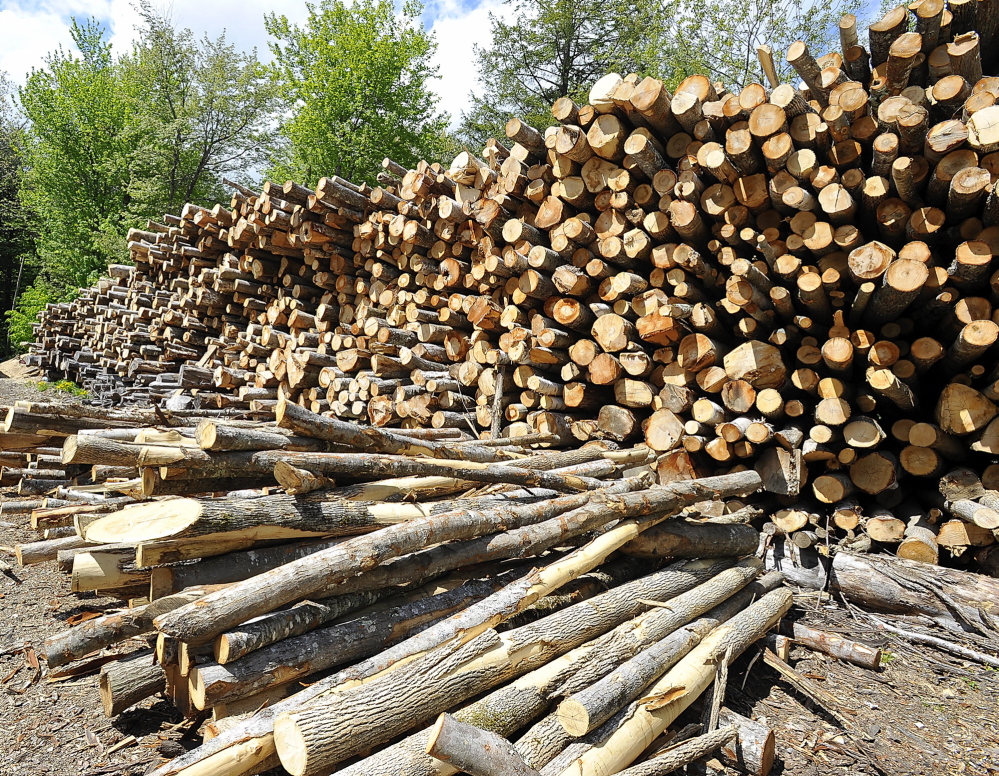PLAINFIELD, Vt. — A new law is about to make timber theft its own class of crime for the first time in Vermont, and one property owner thinks it’s about time.
Brian Morse has been pressing for the change, and has testified at the Legislature, after about 250 trees were cut without his permission from property he had just bought in 2009.
Morse bought the 12-acre parcel along the Winooski River thinking it would be a good place someday to build a cabin to serve as a summer getaway for his family. When he went to take a walk around the property a couple of weeks later, he was in for a shock: Someone had clear-cut 3 acres, removing trees and leaving piles of slash – a jumble of sticks and stumps.
“It was horrible,” he said. He eventually got a $15,000 settlement following a civil complaint that a small logging firm had come onto his property from a neighbor’s property, where they were authorized to cut trees. Morse said the boundary was marked with orange tape, and that a steep ravine separated the neighbor’s land from the parts of his that were cut.
After paying his lawyer, Morse was left with about $10,000. He spent about $12,000 trying to restore his property. “That was just to get started,” he said.
States across the country that have significant forested land see reports of timber thefts, especially in remote areas where witnesses are few and police presence is thin. Some thefts are not discovered for months after they occur, when an absentee owner returns to the targeted property.
“Thanks to high timber prices, timber theft is an attractive crime,” said a 2014 report from the Virginia Cooperative Extension Service at Virginia Tech. “It is not only highly profitable for thieves, but it is also difficult to catch and convict them.
“Because efforts to stop thieves have been so unsuccessful, there has been very little publicity about the crime itself,” it said. “As a result, many private landowners do not realize that timber theft is a severe problem which could affect their landholdings.”
Vermont’s new law, signed by Democratic Gov. Peter Shumlin last month, is part of a package of measures effective July 1 designed to increase professionalism in forestry, said Mike Snyder, commissioner of the state Department of Forests, Parks and Recreation.
“We’re trying to support the good guys and raise the bar of accountability in general and clamp down on the bad guys,” Snyder said.
Vermont already has laws against thefts in general. Two Cavendish brothers, Matthew and Joey Wyman, are facing charges in the alleged theft of trees in April from the Proctor-Piper State Forest in that town. Their public defender, Elizabeth Kruska, said they denied the charges at their arraignment Tuesday, but said she could not comment further.
Charges akin to grand larceny, a felony, and petty larceny, a misdemeanor, are tied to the monetary value of the items stolen.
The new timber theft law covers trees of any size and value. It imposes a year in jail and/or a $20,000 fine for a first offense; two years and a $50,000 fine for subsequent offenses.
Lynn McNamara, critical lands manager with The Nature Conservancy’s Vermont chapter, said she and a volunteer were checking on a property the group owns in Greensboro in February when they discovered the theft of about 150 balsam firs, cedars and sugar maples.
Vermont law up to now has allowed a landowner to collect triple the value of the cut trees if the perpetrator can be found and taken to court. The trees were worth an estimated $2,000 on the timber market. Even if a court awarded $6,000, that would be easily swallowed up in legal fees, she said. A police investigation remains open, McNamara said.
“I know nothing’s going to happen,” she said. “It’s just really discouraging.”
Send questions/comments to the editors.



Success. Please wait for the page to reload. If the page does not reload within 5 seconds, please refresh the page.
Enter your email and password to access comments.
Hi, to comment on stories you must . This profile is in addition to your subscription and website login.
Already have a commenting profile? .
Invalid username/password.
Please check your email to confirm and complete your registration.
Only subscribers are eligible to post comments. Please subscribe or login first for digital access. Here’s why.
Use the form below to reset your password. When you've submitted your account email, we will send an email with a reset code.